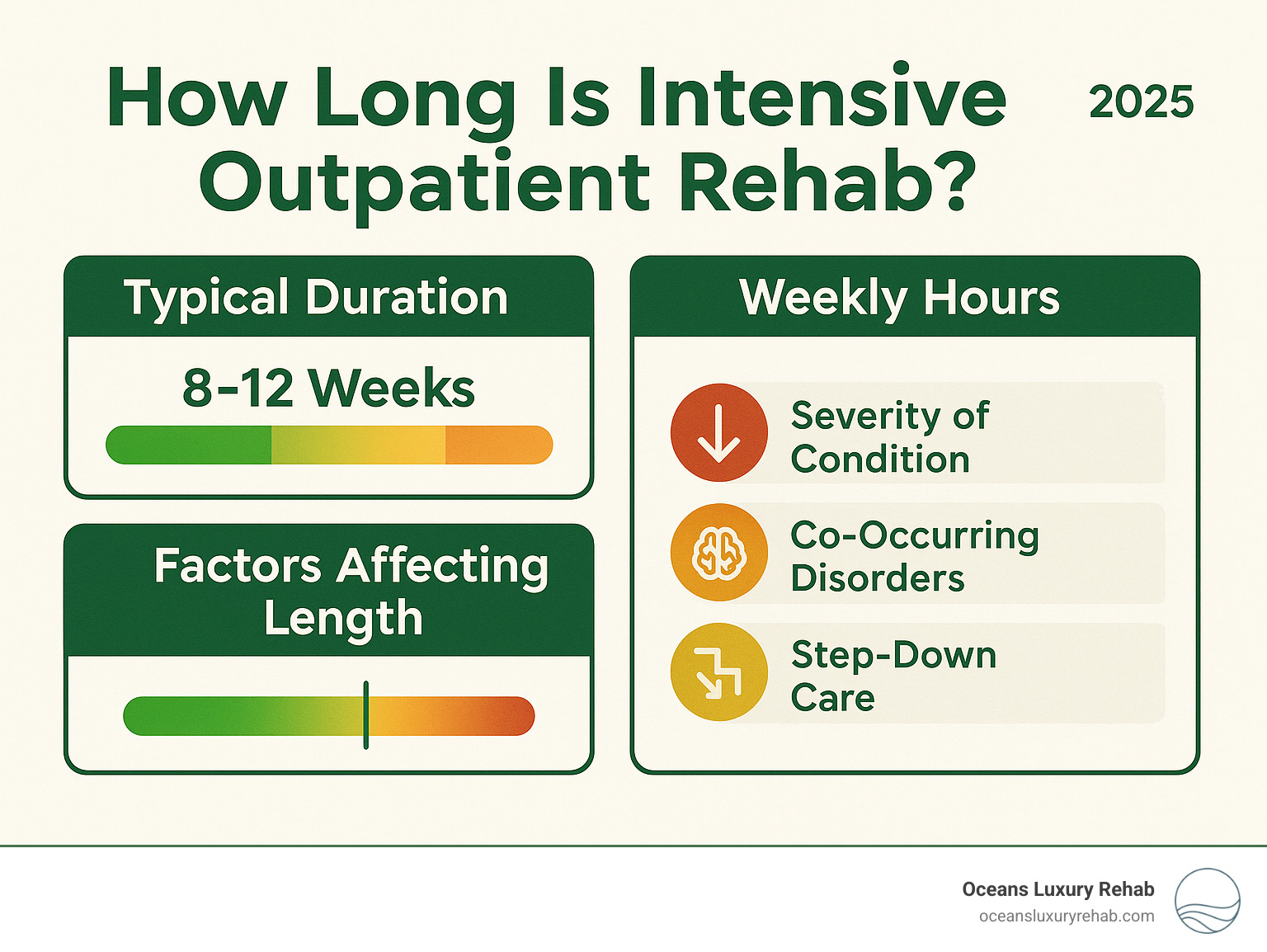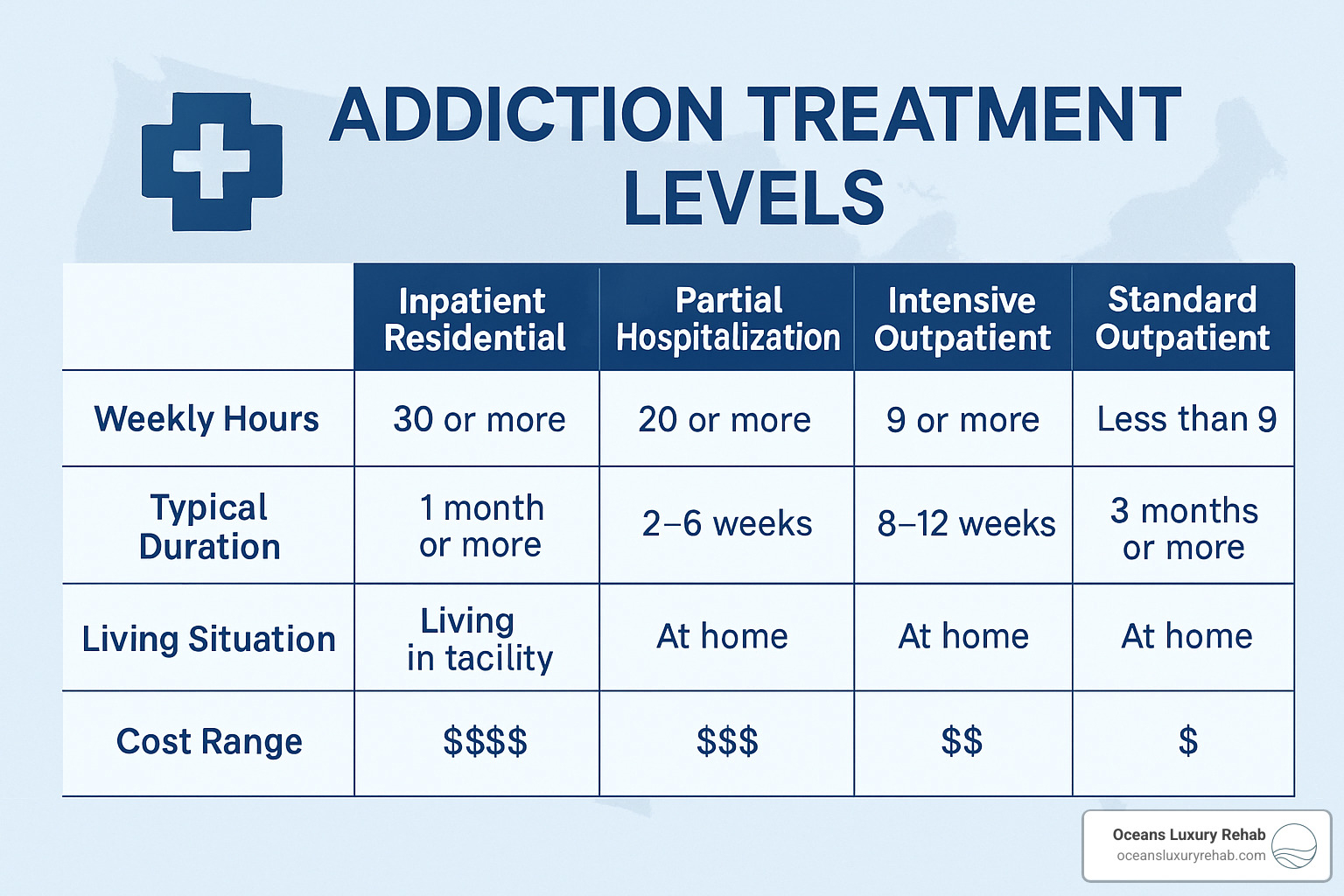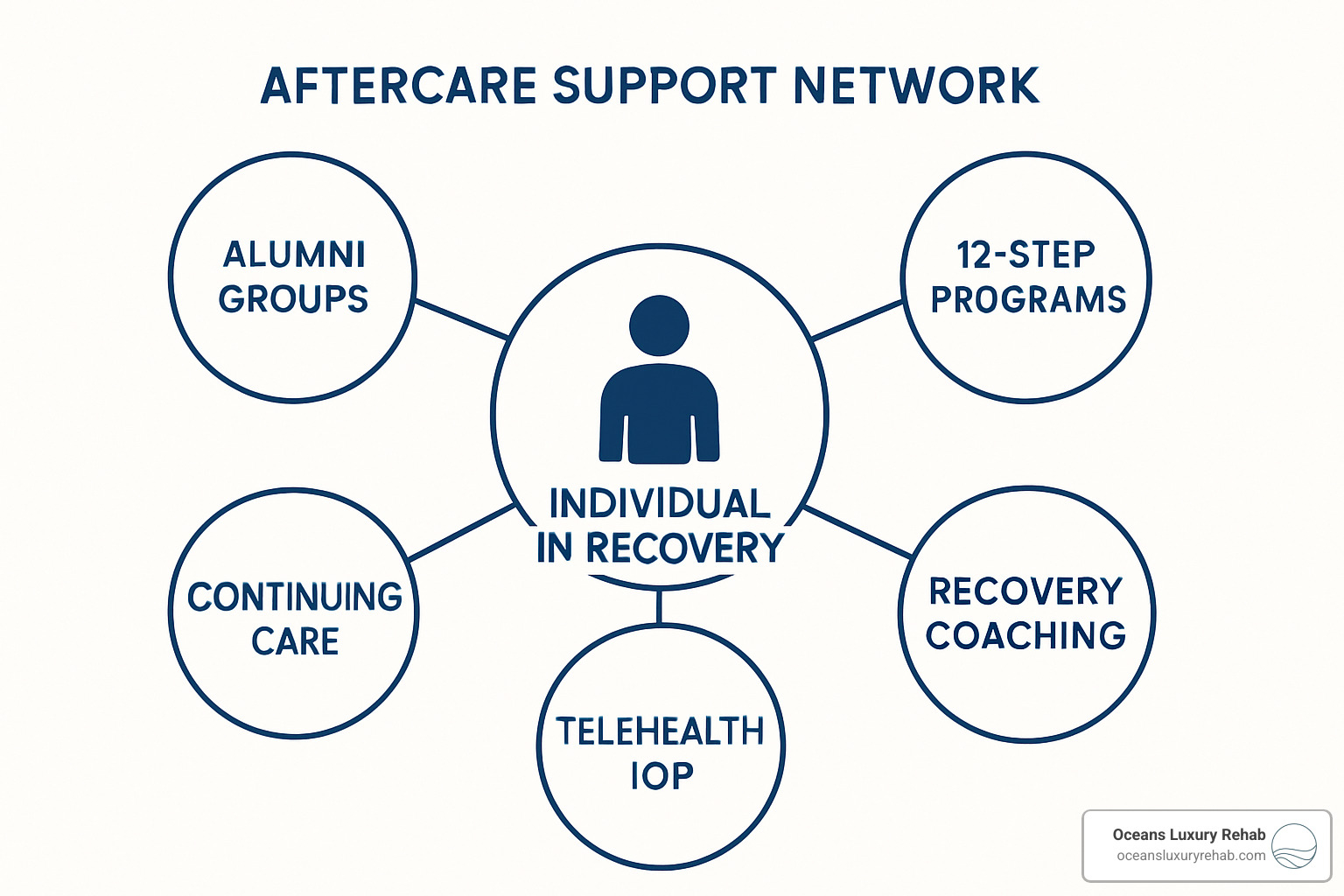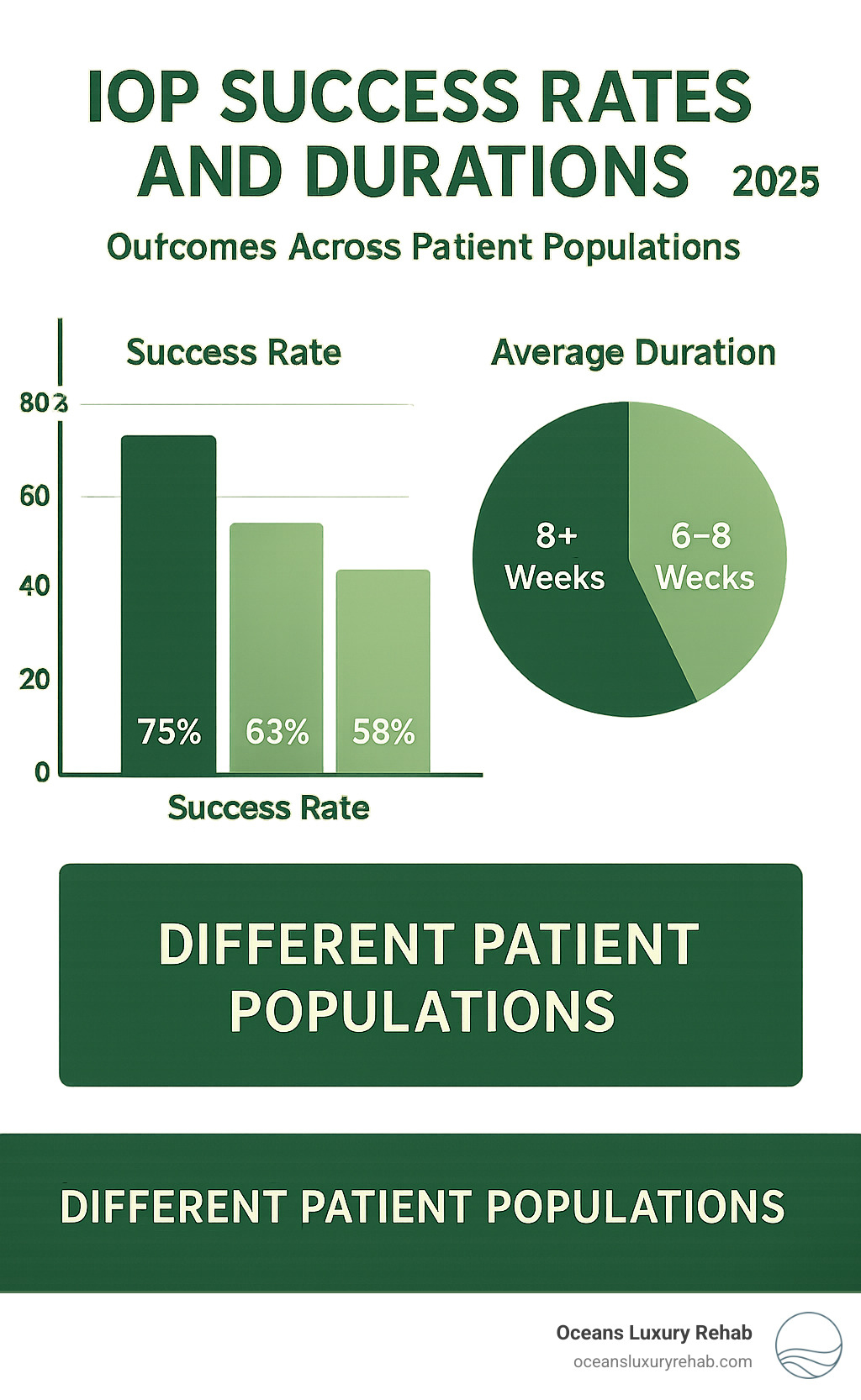Understanding IOP Duration: Your Path to Recovery
How long is intensive outpatient rehab is one of the most common questions people ask when considering treatment options. The answer depends on your unique situation, but here’s what you need to know:
Quick Answer:
- Standard Duration: 8-12 weeks (most common)
- Weekly Commitment: 9-15 hours per week
- Session Schedule: 3-5 days per week, 2-4 hours each
- Extended Programs: Can last 90 days to 1 year for complex cases
- Minimum Recommended: 90 days for best outcomes
Intensive Outpatient Programs (IOPs) offer a middle ground between inpatient care and standard outpatient therapy. They provide structured, intensive treatment while allowing you to maintain work responsibilities and live at home. This flexibility makes IOPs particularly appealing for professionals who need discretion and can’t take extended time away from their careers.
The duration varies significantly based on factors like addiction severity, co-occurring mental health conditions, and individual progress. Research consistently shows that programs lasting at least 90 days produce the best long-term results, though many people begin seeing meaningful progress within the first few weeks.
Unlike residential treatment that requires 24/7 commitment, IOPs typically require 9-25 hours of weekly programming. This allows you to practice new coping skills in real-world settings while maintaining your daily routine.
As Clint Kreider, I’ve spent over 5 years working in addiction treatment and have guided countless clients through determining how long is intensive outpatient rehab based on their specific needs. My experience shows that individualized treatment planning is crucial for success, and the question of duration should always be answered through professional assessment rather than rigid timelines.

How long is intensive outpatient rehab terms to remember:
How Long Is Intensive Outpatient Rehab?
Typical Timeline: How Long Is Intensive Outpatient Rehab?
The most common question we hear is how long is intensive outpatient rehab, and honestly, it’s like asking how long it takes to learn a new skill – it depends on where you’re starting and where you want to go.
Most people spend 8-12 weeks in an intensive outpatient program, but here’s the thing that might surprise you: research shows the 90-day benchmark is where the real magic happens. That’s when we see the most significant improvements in long-term recovery outcomes.
According to the American Society of Addiction Medicine (ASAM), IOPs require at least 9 hours of structured programming per week. This usually means three 3-hour sessions, though some programs offer more intensive schedules with up to 30 contact hours weekly during those crucial first few weeks.
The Scientific research on IOP duration backs up what we see every day – programs lasting at least 90 days produce significantly better results than shorter ones. Think of it like building a house: you need time to lay a solid foundation before you can build the rest.
The journey typically unfolds in three phases. During the first 4 weeks, you’re in initial stabilization mode. This means daily or near-daily sessions, about 15-25 hours per week, focusing on getting you steady and figuring out what’s really going on beneath the surface.
Weeks 5-12 are where the real work happens. You’ll attend 3-5 days per week for 9-15 hours total, diving deep into core therapeutic work and building those essential life skills. This is when family members often get involved too, which can be both challenging and incredibly healing.
The final phase, starting around week 13, is all about phased tapering – gradually reducing session frequency to 6-9 hours per week while preparing you for the next step in your recovery journey.
Factors That Change How Long Intensive Outpatient Rehab Lasts
Not everyone’s recovery timeline looks the same, and that’s completely normal. At our Intensive Outpatient Program, we’ve learned that several key factors can extend or shorten your treatment duration.
Addiction severity plays a huge role in determining timeline. Someone who’s been struggling with substances for years will likely need more time than someone who caught their problem early. It’s not about willpower – it’s about giving your brain the time it needs to heal and rewire itself.
Co-occurring mental health disorders often mean longer treatment periods, and that’s actually a good thing. When you’re dealing with depression, anxiety, PTSD, or other conditions alongside addiction, rushing through treatment would be like trying to fix a car engine while ignoring the transmission problems.
Your individual progress matters enormously. Some people dive headfirst into recovery work and race through milestones, while others need more time to process and integrate new coping strategies. Both approaches are valid – recovery isn’t a competition.
Family support can be a game-changer. Strong, healthy family relationships often accelerate recovery, while unstable home environments may require longer treatment periods. We work with families to create the most supportive environment possible.
Insurance coverage and regional access also influence duration. Here in British Columbia, MSP coverage provides different options than private insurance, and we help steer these systems to ensure you get the care you need.
Previous treatment history tells us a lot about what might work this time. If you’ve been through treatment before, we take extra time to understand what worked, what didn’t, and how to approach things differently.
Your work and life responsibilities affect both program selection and duration. Some clients need more flexible, longer-term programs to balance treatment with family obligations or career demands.
IOP vs. Inpatient vs. Standard Outpatient: Time & Commitment
Understanding your options helps put how long is intensive outpatient rehab into perspective. Think of addiction treatment like a spectrum of care, with each level offering different time commitments and intensities.
| Treatment Level | Weekly Hours | Typical Duration | Living Situation | Cost Range |
|---|---|---|---|---|
| Inpatient/Residential | 24/7 (168 hours) | 30-90 days | On-site facility | $15,000-$50,000+ |
| Partial Hospitalization (PHP) | 30-40 hours | 2-8 weeks | Live at home | $8,000-$15,000 |
| Intensive Outpatient (IOP) | 9-25 hours | 8-52 weeks | Live at home | $5,000-$10,000 |
| Standard Outpatient | 1-8 hours | 3-12 months | Live at home | $2,000-$5,000 |
Inpatient treatment means 24/7 care in a residential facility. It’s intensive and effective, but requires completely stepping away from your daily life. Most people spend 30-90 days in residential care.
Partial Hospitalization Programs (PHP) bridge the gap between inpatient and outpatient care. You’ll spend 30-40 hours per week in treatment but sleep at home.
Intensive Outpatient Programs offer that sweet spot of intensive treatment while maintaining your daily routine. You’ll commit 9-25 hours per week over 8-52 weeks, depending on your needs.
Standard outpatient therapy involves 1-8 hours per week over several months. It’s the least intensive option but works well for people with strong support systems and less severe addictions.
The Scientific research on treatment settings shows that IOPs work as both entry points and step-down options. Many people follow a step-down pathway: starting with detox, moving to inpatient care, then PHP, then IOP, and finally standard outpatient therapy.
The beauty of IOPs is their flexibility. Unlike inpatient treatment that requires taking extended time off work, IOPs allow you to maintain your career while receiving intensive therapeutic support.

Personalizing Duration, Costs & Next Steps
Weekly Schedule Anatomy & Therapies
Picture this: it’s Monday evening, and instead of collapsing on your couch after work, you’re walking into a comfortable therapy room where others understand exactly what you’re going through. This is what a typical IOP week looks like – three 3-hour sessions that fit around your real life.
Most programs schedule sessions during Monday, Wednesday, and Friday evenings from 6:00-9:00 PM, though morning options exist for those who prefer them. This timing allows you to maintain your job while getting the intensive support you need.
Cognitive Behavioral Therapy (CBT) forms the backbone of most IOP programs, helping you identify and change thought patterns that lead to substance use. You’ll also encounter Dialectical Behavior Therapy (DBT), which teaches practical skills for managing overwhelming emotions without reaching for substances.
For those carrying trauma alongside addiction, EMDR therapy can be transformative. 12-Step facilitation introduces you to principles that have helped millions maintain sobriety, while motivational interviewing helps strengthen your personal reasons for change.
Family therapy addresses how addiction affects everyone in your circle. Many programs also incorporate trauma-informed care because addiction rarely exists in isolation.
Holistic approaches make IOP feel less clinical. Mindfulness meditation and yoga teach you to sit with discomfort without numbing it. Art and music therapy give you new ways to express difficult feelings. Nutritional counseling helps rebuild physical health, while exercise programs provide natural mood boosters.
What makes IOP special is this flexibility. You can attend your Tuesday morning meeting, handle that important client call, pick up your kids from school, and still make it to your evening therapy session. For more information about the detox process that may precede IOP, visit our guide on outpatient detox.
Aftercare, Relapse Prevention & Regional Access
Graduation from IOP isn’t the finish line – it’s more like completing driver’s ed before getting your license. The real work of recovery happens in your daily life, which is why aftercare planning is crucial.
Alumni groups meet monthly and provide ongoing connection with others who’ve walked this path. Continuing care involves reduced-frequency therapy sessions as you transition to greater independence.
12-Step programs like AA, NA, and SMART Recovery offer free, lifelong support networks. Recovery coaching provides one-on-one guidance for navigating daily challenges. Telehealth IOP options mean you can access support even when life gets busy.
The Scientific research on relapse prevention shows that recovery is an ongoing process requiring long-term support. This isn’t about willpower – it’s about building sustainable systems for a healthy life.
Regional access varies significantly. In British Columbia, MSP covers many outpatient services through health authorities, though wait times can stretch for weeks. Private clinics offer more immediate access but require insurance coverage or self-pay options.
For residents of Orange County and Southern California, we offer comprehensive IOP services with both in-person and telehealth options.
Warning signs that may require extended treatment include persistent cravings, difficulty managing stress without substances, ongoing relationship conflicts, work problems, isolation from support systems, and untreated mental health symptoms.
Insurance coverage for IOP has improved dramatically as insurers recognize its cost-effectiveness compared to inpatient care. We work with all major insurance providers and offer sliding-scale fees for those who qualify.

Getting Started & Luxury Support
Starting your IOP journey begins with an honest conversation about where you are and where you want to go. At Oceans Luxury Rehab, we provide individualized luxury rehab and detox programs with 24-hour care from trained nurses and specialized doctors.
Our assessment process starts with an initial phone consultation where we discuss your needs without judgment. We handle insurance verification to confirm your coverage and benefits. The clinical assessment involves a comprehensive evaluation of your addiction severity, mental health, and life circumstances.
Treatment planning develops personalized duration and goals that make sense for your specific situation. Program matching ensures you’re placed in the appropriate IOP track and schedule that fits your life.
Our luxury IOP advantages include 24-hour nursing support available for any medical concerns. Specialized doctors trained in addiction medicine are on staff to address complex cases. Luxury facilities provide comfortable, private treatment environments.
Concierge services assist with scheduling and logistics. Holistic approaches include spa services, nutrition programs, and wellness activities that support your overall well-being.
Our Orange County IOP programs span locations throughout Orange County, Los Angeles, Lake Forest, Newport Beach, Costa Mesa, Long Beach, Huntington Beach, and San Clemente. Learn more about our Orange County IOP programs.
What makes our IOP different is our commitment to individualized care plans. Flexible scheduling includes morning, afternoon, and evening options designed for working adults. Professional-friendly programs understand the unique pressures facing busy professionals. Comprehensive services span from detox through aftercare, providing continuity of care.
Getting started today means calling us for a confidential consultation where we can discuss your specific situation. The question of how long is intensive outpatient rehab can only be fully answered through professional assessment, but we can provide realistic timelines based on your unique circumstances.
The goal isn’t to rush through treatment as quickly as possible, but to build a solid foundation for long-term recovery. Whether your IOP lasts 8 weeks or 8 months, the investment in your health and future pays dividends for years to come.
Recovery is absolutely possible, and we’re here to support you every step of the way. Your IOP duration will be customized to your unique needs, ensuring you receive the right level of care for the right amount of time to achieve lasting sobriety.

The journey of recovery is personal and unique to each individual. While we can provide general timelines and expectations, your specific path through IOP will be determined by your progress, needs, and goals. What matters most is that you’re taking the first step toward a healthier, more fulfilling life.
